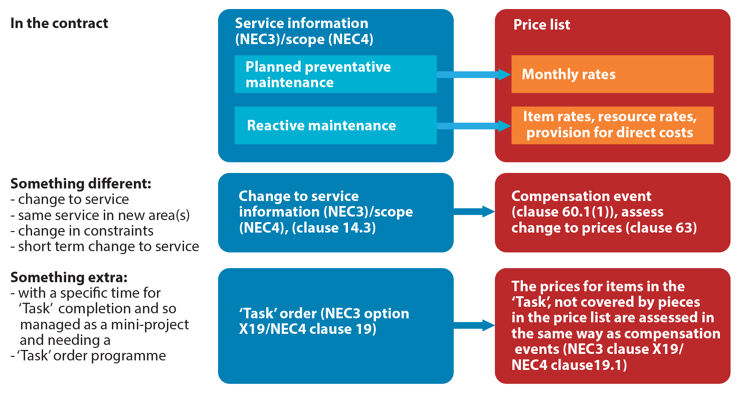
The Term Service Contract (TSC) is NEC’s contract for providing a physical service of any sort at the location of the owner (NEC3 employer/NEC4 client) or occupier of the asset rather than at the offices of the service provider (contractor).
The TSC is endorsed by the British Institute of Facilities Management as good practice for facilities management contracts. It has also been used by the UK government’s Crown Commercial Services as the basis of its wide-ranging facilities-management framework for public-sector authorities.
Users in the facilities management sector nevertheless need to be aware of potential confusion between individual maintenance tasks and a ‘Task’ as specified in the TSC. This is the case in both the NEC3 and NEC4 editions and this article refers to both contracts.
Service information
The TSC is not just a facilities management contract – it allows an employer/client to procure any type of service. The employer/client has to complete a section in the contract (NEC3 service information/NEC4 scope) which specifies and describes the service and states any constraints on how the contractor provides the service.
In the case of facilities management, the service information/scope will contain details of the required planned preventative maintenance and reactive maintenance. These are facilities management terms and not NEC terms.
For TSC options A (priced) and C (target), the tender document will also contain a price list. Typically, the bidder will be required to bid monthly rates for the routine and defined planned preventative maintenance. The prices offered will be based on the asset register, specification and the level of service required as included in the service information/scope. Existing asset information might be given to bidders ‘for information only’, but the bidder will normally prefer it to be included in the service information/scope.
The process for carrying out reactive maintenance will also be set out in the service information/scope. Typically, there will be processes for the contractor and the service manager to initiate a piece of reactive maintenance. In the case of reactive maintenance initiated by the contractor, there will often be a value below which the contractor can proceed without any service manager’s authorisation, subject to later audit. Higher-value reactive maintenance often has to be initiated or accepted by the service manager in advance of the work.
The payment for reactive maintenance, set out in the price list, may be in the form of
- tendered unit rates for particular predefined pieces of reactive maintenance (e.g. change a light bulb)
- tendered resource rates for other reactive maintenance (e.g. hourly rates for electricians)
- a mechanism to reimburse direct costs such as equipment, plant and materials for reactive maintenance.
However, while pieces of reactive maintenance are sometimes called ‘tasks’ in the facilities management industry, it is important to note they are very different from a ‘Task’ under TSC (NEC3 option X19/ NEC4 clause 19) – as discussed in the following sections.
Instructing a change
If the requirements of the employer/client change, the TSC service manager can change the scope/service information, or issue a ‘Task’ order. The scope/service information, its link to the price list and the options for and financial consequences of instructing a change are illustrated in Figure 1.
Changing scope
The service manager can instruct a change to the scope/service information (clause 14.3) to effect
- a change to the service (e.g. cleaner floors or more regular window cleaning)
- an extension of the service (e.g. to new areas or even new buildings)
- a change to the constraints on the contractor (e.g. further access constraints)
- a short-term change to the service (e.g. provide more security guards for a special event).
The compensation-event process is well defined, has great flexibility for the service manager and clear timescales. However, it can take time and is inevitably a little bureaucratic. As with all NEC processes, it works better if the service manager and contractor can work together to agree and then formalise an acceptable quotation.
Issuing a ‘Task’ order
Alternatively, the service manager can issue a ‘Task’ order. NEC3 TSC secondary option X19 gives the service manager the option to issue a ‘Task’ after consultation with the contractor. The ‘Task’ order (clause X19.2) includes
- detailed description of the work in the ‘Task’
- a priced list of pieces of work in the ‘Task’ in which pieces taken from the price list are identified
- the starting and completion dates for the ‘Task’
- the amount of delay damages for the late completion of the ‘Task’
- the total of the prices for the ‘Task’ (when option A (priced contract) or C (target contract) is used) or the forecast total of the prices for the ‘Task’ if option E (reimbursable contract) is used.
NEC4 has brought ‘Task’ order process into the core clauses because experience and use has shown it to be an integral part of the TSC, not just an option. NEC4 TSC clause 19 has much the same process as NEC3 TSC option X19 but, before the service manager issues a ‘Task’ order, the contractor must submit a quotation for the proposed work and have this accepted. It is no longer just after consultation with the contractor but after agreement of a quotation. A decision that a quotation is not accepted or a ‘Task’ order will not be instructed is a compensation event. This highlights the intention that the ‘Task’ order process is intended for significant pieces of work, to be developed and priced co-operatively.
The key difference in a TSC ‘Task’ compared with a simpler service manager’s instruction (clause 14.3) is that the ‘Task’ has to be completed by the ated ‘Task’ completion date. If it is not, then the contractor pays the stated delay damages (which the employer/client can choose to include). Because of the time issues and the impact of the timetable on the employer/client’s day-to-day business, for each ‘Task’ the contractor has to prepare and maintain a ‘Task’ order programme.
The programme requirements (NEC3 clause X19.6/NEC4 clause 33) and its use in assessing the time impact of compensation events (NEC3 clause X19.11/NEC4 clause 63.6) are almost identical to those in the NEC’s main Engineering and Construction Contract (ECC). This detailed programme is needed for properly managing the project that is the ‘Task’. Clearly the service manager needs to be aware of the management requirements for each ‘Task’ on both the contractor and the service manager.
However, those wanting to use ‘Tasks’ for significant projects should note that the TSC, and therefore ‘Tasks’, have
- no compensation events for physical conditions or weather
- no provisions for design of permanent works
- no provisions for contractor design of plant and materials to be installed at the affected property.
The authors are aware of TSC contracts for facilities management that have been modified with Z clauses to allow the parties to manage significant standalone work under the terms of an ECC, effectively requiring the contractor to act as a management contractor for that work. Drafted carefully, this is an approach to complex work within the TSC service.
Lots of little ‘Tasks’
There is no ordering process in the TSC for minor pieces of reactive maintenance work, unlike other contract forms. The scope should define the procedure for ordering these reactive tasks or ‘jobs’, which are often instructed through a call centre operated by the employer/client or contractor. The call-centre procedures then formalise the instruction process for the work.
Contracts have been observed where every reactive maintenance task is instructed and considered as a ‘Task’, using the ‘Task’ order terminology, even though these are effectively simple orders often remeasured for the purposes of payment. This needs to be avoided if at all possible.
If the language of the facilities management software or the financial procedures of the employer/client require this approach, then the documentation and communication forms need to make it very clear what sort of ‘task’ is being considered.
Conclusion
The employer/client (when setting up a TSC) and the service manager (when managing a TSC) need to understand the options, benefits, limitations and bureaucracy in ordering work under a TSC. This includes
- managing reactive maintenance within the service information/scope (which should be set up prior to award of contract)
- instructing changes to the service information/scope
- issuing ‘Task’ orders.
Additionally, without significant amendments to the contract, the ‘Task’ order process is not suitable for complex extra work. TSC users therefore need to define the boundary where a ‘Task’ would be more appropriately procured through a separate ECC contract, inside or outside the TSC contract.
The TSC is designed primarily for a routine service – planned preventative maintenance and reactive maintenance in the case of facilities management – with the flexibility to issue ‘Tasks’ for mini-projects in connection with that service.
If considering using the TSC to manage a series of significant projects, see Richard Patterson’s article here.




